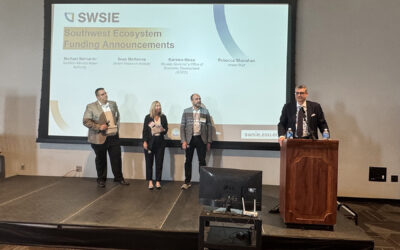New study from the Healthy Nevada Project® shows strong influence of genes and environment on human health

Reno, Nev. (March 9, 2022) –New research from the Healthy Nevada Project® found associations between genetics, obesity, and childhood trauma, linking social health determinants, genetics, and disease. The study, which was published this week in Frontiers in Genetics, found that participants with specific genetic traits and who experience childhood traumas are more likely to suffer from adult obesity.
In 2016, DRI and Renown Health launched the Healthy Nevada Project®, the nation’s first community-based, population health study, which now has more than 60,000 participants. The project is a collaboration with personal genomics company, Helix, and combines genetic, environmental, social, and clinical data to address individual and community health needs with the goal of improving health across the state and the nation.
The new study focuses on Adverse Childhood Experiences (ACEs), which are traumatic and unsafe events that children endure by the age of 18. Over 16,000 participants in the Healthy Nevada Project® answered a mental health survey, and more than 65 percent of these individuals self-reported at least one ACE occurrence. These 16,000 participants were cross-referenced with their genetic makeup, and clinical Body Mass Index (BMI) measures.
According to the research team’s findings, study participants who had experienced one or more types of ACE were 1.5 times more likely to become obese adults. Participants who experienced four or more ACEs were more than twice as likely to become severely obese.
“Our analysis showed a steady increase in BMI for each ACE a person experienced, which indicates a very strong and significant association between the number of adverse childhood experiences and adult obesity,” said lead author Karen Schlauch, Ph.D., of DRI. “More importantly, participants’ BMI reacted even more strongly to the occurrence of ACEs when paired with certain mutations in several genes, one of which is strongly associated with schizophrenia.”
“We know that genetics affect disease in the Healthy Nevada Project® [https://pubmed.ncbi.nlm.nih.gov/31888951/], and now we are recognizing that ACEs also affect disease,” said Healthy Nevada Project® Principal Investigator Joseph Grzymski, Ph.D., of DRI and Renown Health. “Our new study shows that the combination of genes and environmental factors like ACEs, as well as many social determinants of health, can lead to more serious health outcomes than either variable alone. More broadly, this new work emphasizes how important it is for population genetic studies to consider the impact of social determinants on health outcomes.”
The study team believes that it is important for clinical caregivers to understand the strong impact that negative childhood experiences such as ACEs can have on both child and adult health. The researchers hope the information from this study will encourage doctors and nurses to conduct simple screenings for ACEs and consider a patient’s social environment and history in combination with genetics when developing treatment plans for better patient health.
According to the 2019 Youth Behavior Risk Survey (YRBS), 25.6 percent of Washoe County teenagers are overweight or obese. Obesity is a serious health concern for children and adolescents. According to the Centers for Disease Control and Prevention, obese children and adolescents are more likely to become obese as adults.
“Obese and overweight children and adolescents are at risk for multiple health problems during their youth, which are likely to be more severe as adults,” said Max J. Coppes, MD, PhD, MBA, FAAP, Nell J Redfield Chair of Pediatrics at the University of Nevada Reno School of Medicine, Physician in Chief of Renown Children’s Hospital. “Obese and overweight youth are more likely to have risk factors associated with cardiovascular diseases, such as high blood pressure, high cholesterol, and type 2 diabetes. Losing weight, in addition to a healthy diet, helps to prevent and control multiple chronic diseases and improves quality of life for a lifetime.”
“We’d like to thank all of the Healthy Nevada Project® participants who provided information to make our work possible,” said Robert Read, M.S., of DRI. “Our research illustrates that it’s not just genetics that cause disease, but that our environment and life experiences interact with our genes to impact our health in ways that we are only beginning to understand.”
Many thanks to Renown Health, the Stacie Mathewson Behavioral Health and Addiction Institute, and the Center for Genomic Medicine at DRI for supporting this significant work. Renown is currently enrolling participants in the world’s largest community-based genetic population health study, the Healthy Nevada Project®. For more information, visit renown.org.
More information:
The full text of the study, The Impact of ACEs on BMI: An Investigation of the Genotype-Environment Effects of BMI, is available from Frontiers in Genetics: https://www.frontiersin.org/articles/10.3389/fgene.2022.816660/full
This project was funded by the Stacie Mathewson Behavioral Health and Addiction Institute, Renown Health, and the Renown Health Foundation. Study authors included Karen Schlauch (DRI), Robert Read (DRI), Iva Neveux (DRI), Bruce Lipp (DRI), Anthony Slonim (Renown Health), and Joseph Grzymski (DRI/Renown Health).
For more information on the Healthy Nevada Project®, please visit: https://healthynv.org/
###
About DRI
The Desert Research Institute (DRI) is a recognized world leader in basic and applied environmental research. Committed to scientific excellence and integrity, DRI faculty, students who work alongside them, and staff have developed scientific knowledge and innovative technologies in research projects around the globe. Since 1959, DRI’s research has advanced scientific knowledge on topics ranging from humans’ impact on the environment to the environment’s impact on humans. DRI’s impactful science and inspiring solutions support Nevada’s diverse economy, provide science-based educational opportunities, and inform policymakers, business leaders, and community members. With campuses in Las Vegas and Reno, DRI serves as the non-profit research arm of the Nevada System of Higher Education. For more information, please visit www.dri.edu.
About Renown
Renown Health is the region’s largest, locally governed, not-for-profit integrated healthcare network serving Nevada, Lake Tahoe and northeast California. With a diverse workforce of more than 7,000 employees, Renown has fostered a longstanding culture of excellence, determination and innovation. The organization comprises a trauma center, two acute care hospitals, a children’s hospital, a rehabilitation hospital, a medical group and urgent care network, and the region’s largest, locally owned not-for-profit insurance company, Hometown Health. Renown is currently enrolling participants in the world’s largest community-based genetic population health study, the Healthy Nevada Project®. For more information, visit renown.org.
Media contacts:
Kelsey Fitzgerald, DRI
Senior Communications Official
775-741-0496
Kelsey.fitzgerald@dri.edu
Renown Public Relations
775-691-7308
news@renown.org


